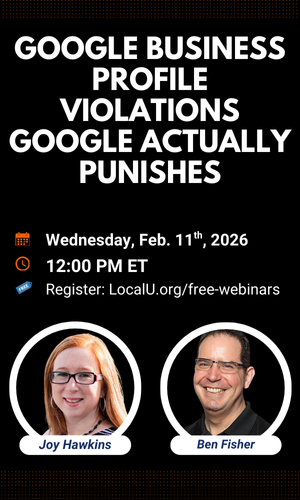askfortransparency
Member
- Joined
- Nov 13, 2021
- Messages
- 15
- Reaction score
- 17
Hey Local Search Forum,
This question was approved by Joy, who recommended I ask it here.
I have a question for those of you who work in the local business space.
Question: From 0-10, how valuable would it be, to know a customer's reviewer profile data (Google, Yelp ect) as soon as their email address was entered into your CRM.
Let's say, for example, a customer entered their name/email address to get a quote for something.
From their email address, now you have their reviewer profiles (40% match)
Now, before you go to their home or even work with them you have the following data:
- Active or Not
- Writes mostly:
positive reviews
negative reviews
mixed
Then, a tag can be placed within the CRM.
(GAP) - Google Active Positive, or (YAN) - Yelp Active Negative
Why I think it's kind of cool:
- You get to be warned in advance if a customer writes mostly negative reviews (potential red light?) and you can tread a bit more carefully, or pass on their work.
- You get to know if a consumer regularly writes reviews and can make sure to give them a great experience they can share online.
Why I think it's kind of - mehhh
- You should treat all customers the same
If you have any thoughts, pros/cons - etc please feel free to chime in!
Thanks for listening.
This question was approved by Joy, who recommended I ask it here.
I have a question for those of you who work in the local business space.
Question: From 0-10, how valuable would it be, to know a customer's reviewer profile data (Google, Yelp ect) as soon as their email address was entered into your CRM.
Let's say, for example, a customer entered their name/email address to get a quote for something.
From their email address, now you have their reviewer profiles (40% match)
Now, before you go to their home or even work with them you have the following data:
- Active or Not
- Writes mostly:
positive reviews
negative reviews
mixed
Then, a tag can be placed within the CRM.
(GAP) - Google Active Positive, or (YAN) - Yelp Active Negative
Why I think it's kind of cool:
- You get to be warned in advance if a customer writes mostly negative reviews (potential red light?) and you can tread a bit more carefully, or pass on their work.
- You get to know if a consumer regularly writes reviews and can make sure to give them a great experience they can share online.
Why I think it's kind of - mehhh
- You should treat all customers the same
If you have any thoughts, pros/cons - etc please feel free to chime in!
Thanks for listening.




